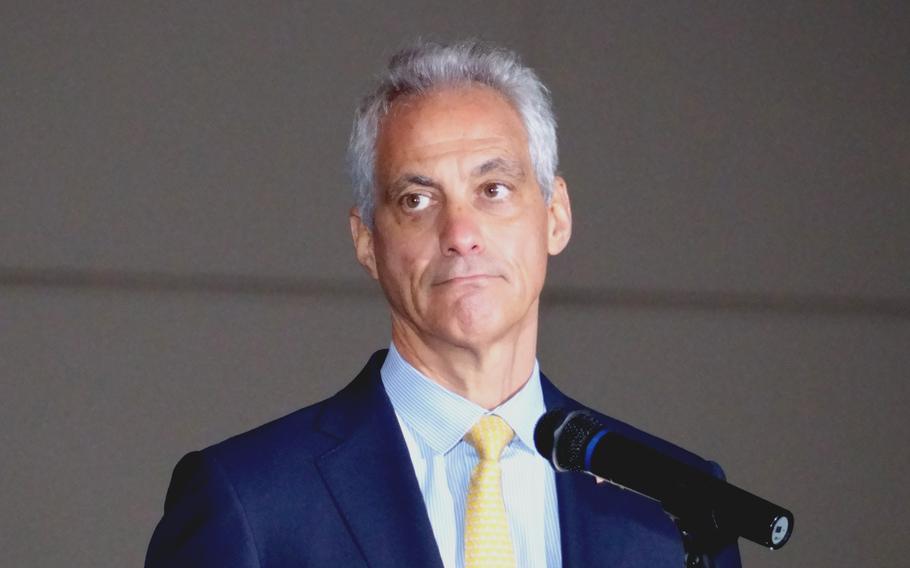
U.S. Ambassador to Japan Rahm Emanuel speaks to American and Japanese troops after a 3-mile run at Camp Zama, Japan, Wednesday, June 14, 2023. (Kelly Agee/Stars and Stripes)
TOKYO — Rahm Emanuel makes a strong case for Japan as America’s No. 1 ally during an interview on the “Freakonomics Radio” podcast set to air Wednesday in the U.S.
But, he would say that, given his reputation for bulldog advocacy and the fact he’s the U.S. ambassador to Japan.
Asked by podcast host Stephen Dubner if Japan thinking of itself as a military power is an odd proposition, Emanuel, a former Illinois congressman, chief of staff for President Barack Obama and mayor of Chicago, turned the question around.
“OK, so if you thought of it the way you phrased it, which is just a military ally, you’re missing two-thirds of the relationship,” he said.
Emanuel laid out the case for a stronger Japan in light of China’s economic and military rise in the Indo-Pacific. Stars and Stripes obtained a transcript of the podcast under embargo until it aired.
The U.S. is already deeply tied to Japan, as “a political, diplomatic, economic and cultural ally,” he said.

U.S. Ambassador to Japan Rahm Emanuel at the U.S. Embassy in Tokyo on March 2, 2022. (Akifumi Ishikawa/Stars and Stripes)
Emanuel’s remarks aired as Japanese Prime Minister Fumio Kishida prepared to meet Friday at Camp David, Md., with President Joe Biden and South Korean President Yoon Suk Yeol.
“China has fundamentally altered Japan, the region, and made people think different, act different,” Emanuel said. “Because the region as a whole — you can see it from India to Japan, South Korea, you can see Australia, Philippines, others — realize that an untethered China, an unmatched China, is a China that doesn’t follow the good-neighbor policy.”
Japan has made four “historic” commitments recently in national security and diplomacy, he said during the podcast.
“One is they agreed to go from 1% of the GDP in defense to 2%. They are going to become the third-largest defense budget in the world,” Emanuel said.
Japanese defense spending is set to increase by nearly 25% in the coming fiscal year as China continues shows of force around Taiwan; the nearby Senkaku Islands, which are controlled by Japan; and in the South China Sea.
No. 2, Japan is planning to acquire missiles that can reach offensive missile sites in China and North Korea, a counterstrike capability to offset a potential threat from that direction. That represents “a change in strategic thinking,” Emanuel said.
On the business front, Japan is restricting the sale of companies to potential foes if those companies are essential to national security, and No. 4, it’s weighing whether to give “defensive weapons” to other countries to protect their civilian populations, he said.
“And those are all things that everybody, before I got here 18 months ago said, A, can’t happen; B, you get one of these, unbelievable,” Emanuel said.
The U.S. has influenced those decisions, Emanuel said in response to a Dubner question.
The U.S. is Japan’s No. 1 ally by treaty and has “probably one of the largest, if not the largest” American military presence there of anywhere in the world. “So, we played a significant role up to a line, and then it’s a sovereign nation’s decision,” Emanuel said.
Economically, the U.S. and Japan for the fourth consecutive year “are respectively the No. 1 investor in each other’s country in the world,” he said.
Emanuel arrived in Tokyo in January 2022 and frequently tweets his travels around the country. He told Dubner he admires Japan’s overall serenity.
“People let their 5-year-olds out to walk to school,” he said. “A car stops because a child has a hand up and walks, and just the world comes to a halt for the safety and security of a child.”